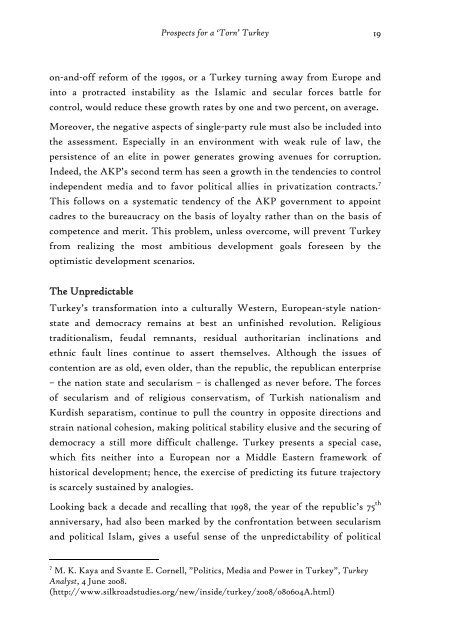2008_10_SRP_CornellKaraveli_Turkey
2008_10_SRP_CornellKaraveli_Turkey
2008_10_SRP_CornellKaraveli_Turkey
Create successful ePaper yourself
Turn your PDF publications into a flip-book with our unique Google optimized e-Paper software.
Prospects for a ‘Torn’ <strong>Turkey</strong> 19<br />
on-and-off reform of the 1990s, or a <strong>Turkey</strong> turning away from Europe and<br />
into a protracted instability as the Islamic and secular forces battle for<br />
control, would reduce these growth rates by one and two percent, on average.<br />
Moreover, the negative aspects of single-party rule must also be included into<br />
the assessment. Especially in an environment with weak rule of law, the<br />
persistence of an elite in power generates growing avenues for corruption.<br />
Indeed, the AKP’s second term has seen a growth in the tendencies to control<br />
independent media and to favor political allies in privatization contracts. 7<br />
This follows on a systematic tendency of the AKP government to appoint<br />
cadres to the bureaucracy on the basis of loyalty rather than on the basis of<br />
competence and merit. This problem, unless overcome, will prevent <strong>Turkey</strong><br />
from realizing the most ambitious development goals foreseen by the<br />
optimistic development scenarios.<br />
The Unpredictable<br />
<strong>Turkey</strong>’s transformation into a culturally Western, European-style nationstate<br />
and democracy remains at best an unfinished revolution. Religious<br />
traditionalism, feudal remnants, residual authoritarian inclinations and<br />
ethnic fault lines continue to assert themselves. Although the issues of<br />
contention are as old, even older, than the republic, the republican enterprise<br />
– the nation state and secularism – is challenged as never before. The forces<br />
of secularism and of religious conservatism, of Turkish nationalism and<br />
Kurdish separatism, continue to pull the country in opposite directions and<br />
strain national cohesion, making political stability elusive and the securing of<br />
democracy a still more difficult challenge. <strong>Turkey</strong> presents a special case,<br />
which fits neither into a European nor a Middle Eastern framework of<br />
historical development; hence, the exercise of predicting its future trajectory<br />
is scarcely sustained by analogies.<br />
Looking back a decade and recalling that 1998, the year of the republic’s 75 th<br />
anniversary, had also been marked by the confrontation between secularism<br />
and political Islam, gives a useful sense of the unpredictability of political<br />
7 M. K. Kaya and Svante E. Cornell, ”Politics, Media and Power in <strong>Turkey</strong>”, <strong>Turkey</strong><br />
Analyst, 4 June <strong>2008</strong>.<br />
(http://www.silkroadstudies.org/new/inside/turkey/<strong>2008</strong>/080604A.html)


